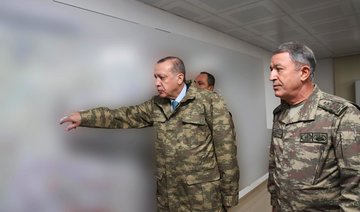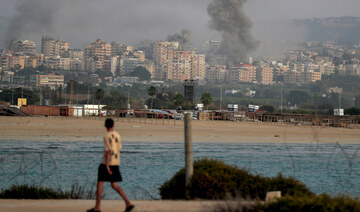MOSCOW: Russian President Vladimir Putin currently has no plans to attend a Syria peace congress in the Russian city of Sochi, Kremlin spokesman Dmitry Peskov said on Friday.
Peskov said the congress, which Russia will host on Monday and Tuesday, will be important but will not find a definitive political solution to the Syria crisis.
Putin also discussed the situation in Syria’s Afrin with the national security council on Friday, Interfax news agency cited Peskov as saying.
Peskov said Putin spoke about Afrin in a phone call with Turkish President Recep Tayyip Erdogan on Tuesday.
The Syrian opposition was expected to decide on Friday whether to attend the congress, a spokesman said in Vienna as the UN held separate talks on finding a way out of conflict.
The UN-brokered talks — of which this is the ninth round — have made little progress so far.
Having regained the upper hand on the battlefield after nearly seven years of conflict, President Bashar Assad appears unwilling to negotiate with his enemies at all, let alone step down as part of any peaceful solution as opposition groups have demanded.
Arriving at the UN offices in Vienna on Friday, the talks’ host, UN Special Envoy for Syria Staffan de Mistura, told reporters he expected “a long meeting.”
With a breakthrough unlikely, a question at the center of Friday’s discussions was whether the opposition will attend a Syria peace conference next week in the Russian Black Sea resort town of Sochi, which Moscow announced after the last round of UN talks in December.
Western powers and some Arab states believe Sochi is an attempt to create a parallel political track that would undermine the UN and lay groundwork for a solution more suitable to the Damascus regime and its allies.
The warring sides have not spoken face to face — a Syrian regime delegation was due to meet De Mistura in the afternoon. De Mistura was expected to make a statement at the end of the talks.
Previous rounds have taken place sporadically in Geneva, with a mandate to discuss new elections, reformed governance, a new constitution and the fight against terrorism.
At the last round in December, the Syrian regime delegation objected to the opposition’s tough line on the future of Assad, and those talks achieved nothing.
Syrian regime forces are pursuing offensives against two remaining opposition pockets, Idlib in the northwest and Eastern Ghouta near Damascus.
Speaking in Abu Dhabi, US House Speaker Paul Ryan said on Thursday that he did not envision a “strategic alliance” with Russia in Syria as Washington looks to end Daesh and curb Iran.
“I don’t see strategic alliance — perhaps tactical symmetry for a convenient moment, but not a strategic alliance,” the high-ranking Republican said during a public debate on a visit to Abu Dhabi.
“What matters most to us in Syria is defeating ISIS (Daesh) and preventing Iran from having a land bridge and Hezbollah a foothold,” he said. “Question remains is that something Russia would embrace?”
Military base
Danny Danon, Israel’s UN ambassador, accused Iran of attempting to turn Syria into “the largest military base in the world” to destabilize the region, threaten Israel and “terrorize the entire free world.”
Danon told the UN Security Council that classified information he was releasing showed that 82,000 fighters are currently under Iranian authority in Syria.
He said the fighters include 60,000 Syrians, 9,000 members of Hezbollah, 3,000 Iranian Revolutionary Guard members and “10,000 members of violent militias recruited from across the Middle East, including Iraq, Afghanistan and Pakistan.”
Danon said the Iranians “speak about 100,000 troops under their control in Syria.”
In addition, he said, Iran is investing “hundreds of millions of dollars” in Syria including on land and factories.


























